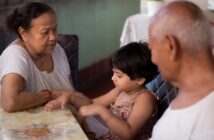1. Introduction
When a loved one receives a mesothelioma diagnosis, the emotional and psychological impact on the family can be profound. Mesothelioma, a rare and aggressive cancer primarily caused by asbestos exposure, often presents in its later stages, making the diagnosis sudden and overwhelming. Families are not only forced to grapple with fear and uncertainty but are also required to make swift and complex decisions regarding treatment, legal matters, and care planning.
Unlike more common cancers, mesothelioma demands a steep learning curve. The rare nature of the disease often means caregivers and families are navigating unfamiliar territory—medical jargon, specialist appointments, and potential legal claims for asbestos exposure compensation. At the same time, they must also manage their own emotional well-being to stay strong for the patient.
This guide is designed to help family members and caregivers cope effectively—providing both emotional support strategies and practical steps. Whether you’re just starting this journey or seeking ways to manage the daily realities of caregiving, this article offers structured insights rooted in compassion, clarity, and current resources.
2. Background & Context
Mesothelioma affects approximately 3,000 people annually in the U.S. and is most commonly linked to occupational asbestos exposure—particularly in industries such as construction, shipbuilding, and manufacturing. The disease has a long latency period, often taking 20–50 years to manifest symptoms like shortness of breath, chest pain, and fluid buildup source: American Cancer Society.
By the time it is diagnosed, mesothelioma is usually in an advanced stage, and treatment options may be limited. This can intensify the emotional shock for patients and families alike. In many cases, families must also confront the reality that the disease is terminal, with a median survival time of 12 to 21 months depending on the stage and type of mesothelioma source: National Cancer Institute.
Compounding this is the need for swift legal action. Since mesothelioma is almost always caused by asbestos exposure, patients may be eligible for compensation through lawsuits or asbestos trust funds source: Mesothelioma Applied Research Foundation. However, these legal steps come with their own emotional burden and timelines, adding further stress.
Understanding these complex dynamics helps families better prepare emotionally and practically. The coping strategies explored in this article are tailored to the specific needs and stages of the mesothelioma journey, from diagnosis to end-of-life care.
3. Key Highlights: Emotional and Practical Coping Strategies
a. Accepting the Diagnosis Together
Denial is a common initial response to a cancer diagnosis, but accepting the reality early helps families plan more effectively. Open, honest conversations—no matter how painful—create space for emotional intimacy and shared decision-making. Consider involving a social worker or counselor early in the process to facilitate communication source: CancerCare.
b. Empower Yourself With Knowledge
Information reduces fear. Educate yourself about mesothelioma, including its types (pleural, peritoneal, pericardial), staging, and treatment options. The Mesothelioma Center and NIH offer up-to-date, medically reviewed content that helps families feel more in control.
c. Create a Medical Binder
A centralized file with medical records, appointment logs, test results, and medication lists helps reduce overwhelm. Apps like MyChart and CareZone can assist in organizing and sharing this data across caregivers.
d. Take Advantage of Support Groups
Both patients and caregivers benefit from speaking to others facing similar challenges. The Mesothelioma Applied Research Foundation and Cancer Support Community offer online and in-person support groups.
e. Build a Caregiving Team
Caring for a mesothelioma patient is emotionally taxing and physically exhausting. Engage family, friends, neighbors, or professional caregivers to share the load. Consider a family meeting to divide responsibilities and plan rotations. Utilize hospice or palliative care services early—they are not just for end-of-life but also to manage symptoms and improve quality of life source: National Hospice and Palliative Care Organization.
f. Prioritize Mental Health
Chronic stress, anxiety, and even depression are common among caregivers. Speak with a therapist familiar with cancer caregiving or consider caregiver coaching. Many employers offer Employee Assistance Programs (EAPs) that include counseling services.
g. Celebrate Small Moments
While the diagnosis alters life’s trajectory, meaningful experiences can still occur. Celebrate birthdays, share favorite meals, or watch a beloved movie together. These moments don’t need to be grand to be deeply memorable.
4. Deep Dive on Top Vendors: Resources That Can Help Families Cope
In the context of mesothelioma care, “vendors” can include medical institutions, legal firms, support networks, and service providers. Here’s a breakdown of the top organizations that offer tangible value to families coping with this illness.
a. The Mesothelioma Center (Asbestos.com)
This nonprofit provides a wide array of free resources including:
- Free medical guides and books.
- Patient advocacy services to connect patients with top mesothelioma doctors.
- Legal support to explore compensation options.
Their online chat and 24/7 phone service offer real-time assistance for families feeling overwhelmed.
🔗 Visit The Mesothelioma Center
b. The American Cancer Society (ACS)
The ACS provides robust educational tools, clinical trial locators, and caregiver resources. Their 24/7 helpline (1-800-227-2345) is invaluable for families seeking immediate guidance.
c. Mesothelioma Veterans Center
Veterans account for a large percentage of mesothelioma cases due to historical asbestos use in the military. This organization helps families:
- Navigate VA benefits and compensation claims.
- Locate VA-approved treatment centers.
🔗 Visit Mesothelioma Veterans Center
d. National Cancer Institute (NCI)
A government body with detailed treatment summaries, survivorship resources, and links to cutting-edge research.
e. Legal Vendors: Weitz & Luxenberg / Simmons Hanly Conroy
Legal representation is critical. These firms specialize in mesothelioma litigation and offer contingency-based support (no upfront costs). They also help locate asbestos exposure sources—vital for building a strong claim.
🔗 Weitz & Luxenberg
🔗 Simmons Hanly Conroy
5. Strategic Takeaways for Families
To effectively cope with a mesothelioma diagnosis in the family, it’s important to balance emotional resilience with logistical readiness:
- Plan ahead: Discuss treatment goals and end-of-life wishes before they become urgent. Advance directives and living wills are essential.
- Pace yourself: Caregiving is a marathon. Schedule breaks, even if only for a walk or nap. Burnout benefits no one.
- Know your rights: If asbestos exposure is confirmed, explore legal avenues for compensation. These funds can ease medical bills and ensure financial support.
- Leverage help: Don’t hesitate to ask for help—be it emotional, legal, or financial. Many organizations are designed specifically for mesothelioma families.
Clarity, communication, and community are your greatest allies. Use structured tools, stay connected to reputable resources, and remain emotionally attuned to both the patient and yourself.
6. Future Outlook & Market Trends
While mesothelioma remains a challenging diagnosis, advances in research and support systems offer hope for the future. Clinical trials are exploring new treatments like immunotherapy (e.g., Keytruda and Opdivo), gene therapy, and tumor treating fields (TTF), with some showing promise in prolonging survival source: NIH Clinical Trials.
Additionally, global asbestos bans are slowly decreasing new exposure cases. Countries like Canada, the UK, and Australia have banned asbestos, and the U.S. is increasing regulations source: EPA.
On the legal front, asbestos trust funds continue to provide billions in compensation. As of 2025, over $30 billion remains in asbestos-related trusts source: U.S. GAO.
For families, this means access to better care, more knowledgeable physicians, and greater legal and financial recourse than ever before. Emotional support networks are also becoming more accessible, with virtual communities filling geographical gaps.
The fight against mesothelioma is far from over, but the future holds signs of better survivorship and family support.
7. Conclusion + Call to Action (CTA)
Coping with a mesothelioma diagnosis in the family is one of life’s most difficult challenges—but you don’t have to face it alone. With the right information, a strong support system, and timely action, you can create a path of care that honors your loved one while maintaining your own well-being.
Start by educating yourself through trusted sources, seeking emotional and professional support, and exploring compensation options to ease financial burdens. You’re stronger than you think—and help is available every step of the way.
👉 Join a mesothelioma support community today.
👉 Download your free caregiver checklist.
👉 Contact a legal advisor if exposure is suspected.
Your journey matters. And your love, strength, and dedication make all the difference.



